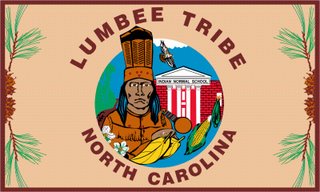
This is the discussion referred to in the "For America to Live..." post.
My grandmother was a Lumbee*, and her ethnicity was very important to her. She instilled that same pride in my mother, and, consequently, my mother raised me to think of myself as an Indian. Aside from darker skin, I don't look like an Indian. In fact, I look more like my German-American father than anything. In addition, I acted like a white kid. We didn't live near our Indian family (though we often visited), and we fit the stereotype of the typical American family. Nonetheless, I always thought of myself as Indian on some level.
As I grew older, my beliefs and views became more important to me. Many of my beliefs could be referred to as "Indian" beliefs. I did not form them because of my ancestry, but my ancestry seemed to explain them.
As I have gotten older, I have become more interested in my genealogy. Research into my Lumbee origins has been eye-opening. Analyses of Lumbee DNA has shown that the group is most likely a "tri-racial isolate." That is, they are a mixture of Whites, American Indians, and Blacks. At first this information shocked me, and to be honest, it still does. However, it makes perfect sense if you work backward. The Lumbee have only recently (the past 75 years or so) been espousing a single, American Indian origin. Prior to that, they didn't consistently identify with any group. In fact, the only references to them as Indians come after the Civil War. In a social system where being Black put you at the bottom, and being 1/8 Black made you Black, it is logical that they would espouse an alternate identity. Before the Civil War, the Lumbee were referred to as "mixed lots" and "free persons of color" (distinct from both free Blacks and Indians). This information, combined with DNA analyses, tends to support the hypothesis that the Lumbee originated when marginalized whites settled with remnant Indian communities. In turn, these mixtures accepted escaped black slaves and/or mulattos into their society.
But how does this affect me? I don't know. Some would argue that you are who you want to be. However, I am a firm believer that our past influences us significantly. This is probably less true in today's world, but it still plays a role. What's especially interesting is my identity as an Indian. Is my family's identity one that was wholly fabricated, or is there legitimacy to it? It's a tough question to answer, and I doubt that I will ever have a concrete one.
Through all of my research, most of my beliefs have not changed. However, I have become less antagonistic toward European culture. In fact, I have learned to embrace my German and (perceived) Scottish heritages as well. For this reason, I am often torn between "White ways" and "Indian ways." This is another interesting topic, but one that will be for another day. However, I would be interested to hear from anyone that feels the same way. Perhaps they could provide insight to a difficult question.
*Note: The Lumbee are a tribe of American Indians found in North Carolina. Most of my family prefers the term "American Indian" to Native American, feeling that the latter is revisionist and problematic. It is also interesting to note that my grandmother's favorite sports teams were the Atlanta Braves and Washington Redskins, for obvious reasons.


2 comments:
Hey, I've got to say, good article! I've got a similar backround myself (Lumbee/British). But I got to say, your questioning whether your Lumbee heritage is made up by your ancestors so that they're not labeled as Blacks is really disappointing. I don't think you would meet any tribe more adamant and proud of their Indian ancestry than the Lumbees. By the if you don't mind me asking, who's your people?
My grandmother was a Brayboy, but I have a lot of Locklear relatives as well...
In regard to Lumbee heritage, I don't mean to insinuate that the Lumbee were once "Blacks." I believe that an African heritage is simply one piece, however large or small, of a larger heritage that includes Europeans and American Indians as well.
Post a Comment